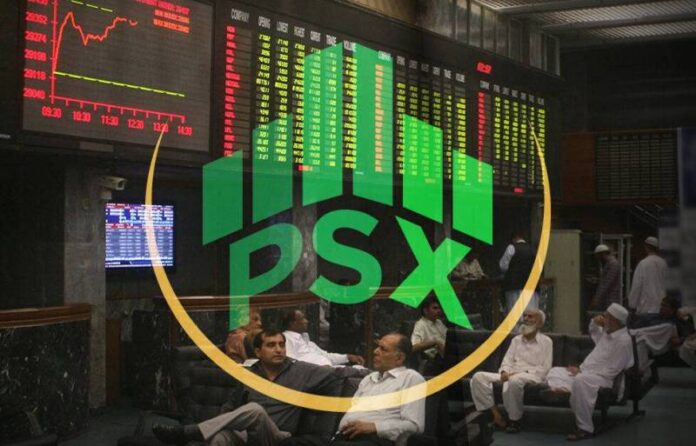After a positive opening and a 1.75% initial gain, the Pakistan Stock Exchange (PSX) witnessed selling pressure, with the KSE-100 index plunging over 6% or more than 6,900 points during intraday trade due to escalating tension between Pakistan and India.
According to the PSX website, the market opened on a positive note and the benchmark index climbed to 111,881.02 level as of 09:35 am, up by 1,872 points or 1.75% from the previous day’s close of 110,009.02 points.
Broad-based selling was seen across key sectors, including automobile assemblers, cement, commercial banks, fertilizer, oil and gas exploration, OMCs, power generation, and refineries. Major index stocks such as HUBCO, ARL, MARI, OGDC, POL, PSO, SSGC, NBP, and UBL were all in the red.
Around 12:40 pm, trading was suspended when the benchmark index was hovering at the 103,060.30 level, down by 6948.72 points or 6.32%.
The market downturn follows reports of a fresh violation of Pakistan’s international borders by India, with the Pakistani military spokesperson confirming that India launched “another blatant act of military aggression” by sending 12 Harop drones to multiple locations across Pakistan last night.
He added that the Pakistan armed forces, being at a high state of alert and vigilance, have so far neutralised 12 Harop drones at various locations.
The initial market surge on Thursday was linked to hopes of de-escalation as several countries and international organizations, including Iran, Russia, the UAE, Saudi Arabia, and the United Nations, have offered mediation between Pakistan and India.
Pakistan’s Prime Minister Shehbaz Sharif also spoke to Gulf allies, including Saudi Arabia, the UAE, and Qatar, seeking their support in mediating the conflict.
The impact of the Indo-Pak tit-for-tat measures on the stock market was significant on Wednesday following the heaviest fighting in more than two decades between the two nuclear-armed neighbors. The KSE-100 lost 6% early in the morning on Wednesday, following the Indian airstrikes, but recovered most of its losses by the close of the day, ending with a 3.13% decline.
Heavy shelling and gunfire were exchanged across the Kashmir frontier after India launched missile strikes on nearly six sites inside Pakistan on the night of May 6-7, resulting in the deaths of 31 civilians and over 50 injuries. In retaliation, the Pakistan military brought down five Indian Air Force jets, including three Rafale, one MiG-21, and one SU-30, following the Indian missile attacks.
On Wednesday, the National Security Committee (NSC) authorised Pakistan’s armed forces to take corresponding actions in response to the Indian airstrikes, which targeted civilian areas. In response, according to media reports, Pakistan shot down five Indian fighter jets.
From April 23 to May 6, the PSX had already lost 4.1% over nine sessions amid growing uncertainty over a potential Indian attack.
Despite these tensions, Pakistan’s stock market remained lackluster, even in the face of major positive developments within the country, such as the IMF board meeting scheduled for May 9 for the first review of Pakistan’s IMF program, a 100bps reduction in the policy rate, and a near-record low inflation reading of 0.3% for April 2025.
When assessing previous Indo-Pakistani conflicts, such as the Pulwama and Balakot issues in February 2019 and the Uri strikes in September 2016, the market had not reacted as negatively as it did this time.
In a surprising turn, yields on Pakistan’s Euro and Sukuk bonds in international markets improved by 18- 61bps after falling by an average of 160bps over the past 8-9 days.
























